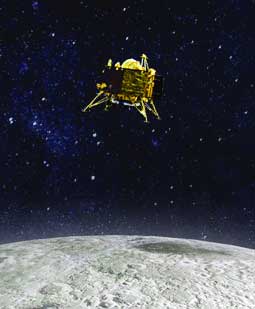No, there is no such thing as failure in scientific missions. The nation and ISRO will move forward
At certain moments in time, you tend to remember the pioneers for inspiration. And for the scientists at the Indian Space Research Organisation (ISRO), the wisdom of Albert Einstein held them together. “Most people say that it is the intellect which makes a great scientist. They are wrong: It is character.” And though they wore grim faces as the Vikram lander missed its perch on the moon, they have re-dedicated themselves to the pursuit of new frontiers the morning after, hoping to retrieve something from the Chandrayaan-2 mission. As the signal from the lander was lost shortly after it descended through two kilometres above the moon’s surface, many thought that it was but a technical glitch, a temporary loss of transmission. However, while there is still some hope of re-establishing contact with the lander over the next two weeks, that hope is remote and depends on whether it made it onto the surface of the moon. Even if we have indeed lost all contact with it, the mission is still a success simply because it dared to execute new technological concepts and chose to explore the moon’s South Pole. Besides, the lunar orbiter of the mission is still recording and sending back images and data from our celestial satellite. Chandrayaan-1 had sent back pictures of water crystals, something which we were planning to explore on the surface. The instruments onboard the orbiter are in perfect health and communicating with the ground station and can send feedback over the next few years as ISRO claims. This includes the search for further evidence of water on the moon and an assessment of its relative abundance. That the margin of error was very less and we wobbled at the finishing line means we have reason to go back to the drawing board and plan a Chandrayaan-3. Lunar landings anyway have had a lower strike rate even in space-programmed nations and we should not believe we have faulted, therefore. In the end, we have dared to experiment. Prime Minister Narendra Modi spoke eloquently when he addressed the nation on this disappointment, saying we will try again and learn from the mistakes. The scientists and team have had failures in the past but those drove them to even greater heights.
What was equally heartening was that during the approach of the lander on Friday night, millions were glued to watching or listening to events as they unfolded. In this hyper-partisan times, it was a rare moment in present-day India that people from opposite political persuasions were united for once. It was but a fleeting moment but it did feel nice that there was a sense of pride at the work that our scientists had done and so what if we had failed, we still could make the journey ahead. That is the message we must take away from this feat. Major scientific expeditions have always had a degree of risk; every nation that has been to space has suffered tremendous failures. Some, like the US, have had their failures broadcast, just like what happened last night. But that did not stop any of them from continuing, and this latest apparent failure will not stop India from its quest to explore the heavens. India’s space programme has punched way above its weight category for years and we should continue our steady progress towards other celestial bodies and also our future manned space missions. While India’s explorations are monuments to national pride, one must not forget that these are missions for the whole of mankind. The spirit of exploration and scientific progress is what makes us all essentially human. But most importantly, what makes us human is our ability to stand up when we fall.
Writer & Courtesy: The Pioneer








 OpinionExpress.In
OpinionExpress.In















Comments (0)